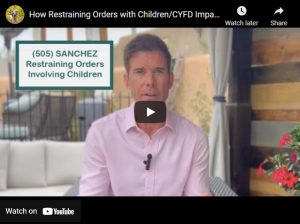Divorce is a challenging experience for everyone involved, especially children. As a parent you play a crucial role in helping your child cope with divorce while navigating through the dark days ahead.
Therefore, it’s important to provide your child with the love, support, and understanding they need to cope with the coming changes. In this article, Sanchez Legal Team shares practical tips that can help you guide your child through the process of divorce in New Mexico.
One of the most important things you can do is to maintain open and honest communication with your child. Encourage your child to express their feelings and emotions. Also, reassure your child that it’s okay to feel sad or confused.
Moving forward, creating a safe space for your child to share their thoughts helps your child process their emotions more effectively.
Additionally, establish a consistent routine and structure in their life. Albuquerque family court judges love to see a consistent and predictable schedule. Moreover, become “child centered.” This means that your life should revolve around your child.
Finally, divorce can disrupt a child’s sense of stability. Therefore, setting clear expectations and maintaining a predictable schedule provides your child with a sense of security.
Remember, every child is unique. So, your child’s reaction to a divorce may vary from another child born within a separate home dynamic. Stay patient, attentive, and supportive as you help your child cope with this life transition. By implementing these practical tips, you can make a positive difference in your child’s emotional well-being during the challenging time of divorce in Albuquerque, New Mexico.
UNDERSTANDING THE IMPACT OF DIVORCE ON CHILDREN
Divorce can have a profound impact on children. Therefore, it’s essential to understand the potential impact that divorce can have on a child’s emotional and psychological well-being. Each child will react differently to divorce, depending on their age, personality, and the circumstances surrounding the separation.
For instance, younger children may have difficulty understanding the concept of divorce and may blame themselves for the breakup. On the other hand, older children and teenagers may experience anger, resentment, and a sense of loss.
It’s important to remember that children often struggle with expressing their emotions. Consequently, it’s crucial to provide your child with a safe and non-judgmental space to release their emotional energy.
Encourage open conversations and let your child know that their feelings are valid. By acknowledging your child’s emotions, you can help your child navigate the complex emotions associated with a contested or uncontested divorce in Albuquerque, New Mexico.
COMMUNICATING WITH YOUR CHILD ABOUT DIVORCE
Maintaining open and honest communication is crucial when helping your child cope with divorce. To begin, explain the situation in age-appropriate language. In doing so, clearly ensure that your child fully understands that the divorce is not their fault. Continually reassure your child that both parents still love them and will continue to be there for them.
Encourage your child to express their feelings and emotions. Moreover, actively listen without judgment. Avoid dismissing your child’s concerns.
Never tell your child how to feel. Instead, validate their emotions and let them know it’s okay to feel sad, angry, or confused. By creating a safe space for them to share their thoughts, you can help them process their emotions more effectively.
CREATING A STABLE AND SUPPORTIVE ENVIRONMENT
Divorce can disrupt a child’s sense of stability. Therefore, it’s crucial to establish a consistent routine and structure in your child’s life. Children thrive on predictability. Moreover, Albuquerque family court judges want to see consistency in a child’s life.
As such, maintaining a stable home environment provides children with a sense of security during this challenging time. Also, a stable and safe home strengthens your claims for custody and visitation.
Regarding visitation, work with your ex-spouse to create a co-parenting plan that outlines clear expectations and schedules. Consistency in parenting styles and rules can help your child feel a sense of normalcy.
On your end, try to establish your ideal visitation schedule immediately after you separate. Establishing a weak visitation schedule after separation creates a poor status quo that can negatively impact your case, if you cannot reach an amicable agreement with your ex-spouse.
On the cooperative side, ensure that both parents are involved in your child’s daily lives and maintain a united front when it comes to discipline and decision-making.
Finally, consider minimizing disruptions in other areas of your child’s life. If possible, avoid changing schools or extracurricular activities during the divorce process. As mentioned, Albuquerque judges love to see child-centered parents that promote stability.
HELPING YOUR CHILD PROCESS THEIR EMOTIONS
Divorce can trigger a range of emotions in children, from sadness and anger to confusion and fear. It’s important to help your child process these emotions in a healthy and constructive way.
Encourage your child to engage in activities that allow them to express themselves, such as drawing, writing, or playing music. These outlets can provide a creative and therapeutic way for them to process their emotions. Consider enrolling them in art therapy or counseling, where they can work with professionals who specialize in helping children cope with divorce.
Additionally, be mindful of your own behavior and emotions during this time. Children are highly perceptive and can pick up on stress and tension. Practice self-care and seek support from friends, family, or a therapist to ensure you are emotionally available and resilient for your child.
CO-PARENTING EFFECTIVELY AFTER AN ALBUQUERQUE DIVORCE
Are you a parent that is facing a divorce in Albuquerque, New Mexico? If yes, successful co-parenting is crucial for your child’s well-being after divorce. It’s essential to communicate openly and respectfully with your ex-spouse, focusing on the best interests of your child.
Arguing and fighting with your ex can lead to a restraining order of protection being entered. In turn, this restraining order can negatively impact your divorce.
Watch this video for more information about the interplay between divorce and restraining orders in Albuquerque, New Mexico.
On the positive side of the spectrum, peacefully try to establish a co-parenting plan that outlines visitation schedules, holidays, and important events. In doing so, stick to the plan as much as possible to provide consistency and predictability for your child. Avoid using your child as a messenger between you and your ex-spouse, as this can put unnecessary pressure on them.
Maintain a united front when it comes to important decisions about your child’s life. Discuss discipline strategies, educational choices, and healthcare decisions together, ensuring that both parents have a say in their upbringing. By maintaining a positive and cooperative relationship with your ex-spouse, you can create a supportive environment for your child.
On the darker side of the spectrum, are you going through a contested divorce in Albuquerque, New Mexico? Does your divorce include allegations of domestic violence, CYFD interaction, or a restraining order of protection?
If so, it is crucial to understand the restraining order process involving children. Watch this informative video for more information on how restraining orders can impact custody and visitation in Albuquerque, NM.
SEEKING PROFESSIONAL HELP FOR YOUR CHILD IN ALBUQUERQUE, NM
In some cases, professional help may be necessary to help your child cope with the emotional challenges of divorce. If you notice persistent changes in their behavior, such as withdrawal, aggression, or a decline in academic performance, consider seeking the assistance of a qualified therapist or counselor.
A mental health professional can provide your child with the tools and strategies they need to navigate their emotions and adjust to the changes in their family dynamic. Therapy can also offer a safe space for your child to express their feelings and receive support from an unbiased third party.
Are you going through a difficult and contentious divorce? Are there allegations of substance abuse, family violence, or emotional distress. If so, Albuquerque judges like to see children in counseling.
Consider contacting an Albuquerque child counseling center such as:
ENCOURAGING HEALTHY COPING MECHANISMS
Teaching your child healthy coping mechanisms is essential for their long-term well-being. Encourage them to engage in activities that promote emotional well-being, such as exercise, journaling, or spending time outdoors. These activities can help them release stress and process their emotions in a positive way.
Additionally, teach your child about the importance of self-care. Encourage them to prioritize activities that bring them joy and relaxation, such as reading, listening to music, or spending time with friends. By promoting self-care, you can empower your child to take control of their emotional well-being.
MAINTAINING A POSITIVE RELATIONSHIP WITH YOUR EX-SPOUSE
While divorce can be emotionally challenging, it’s important to maintain a positive relationship with your ex-spouse for the sake of your child. Set aside any personal animosity and focus on effective co-parenting.
Communicate respectfully and avoid speaking negatively about your ex-spouse in front of your child. Remember, your child loves both parents and may internalize any negative comments or actions. By modeling respectful behavior, you can promote a healthy relationship between your child and their other parent.
Most importantly, a positive relationship increases the chances of an uncontested divorce. Check out this video for more information on getting an uncontested divorce in Albuquerque, New Mexico
TAKING CARE OF YOURSELF AS A PARENT
As a parent, it’s essential to prioritize your own well-being during the divorce process. Take care of yourself physically, emotionally, and mentally. Practice self-care activities that recharge you, such as exercise, meditation, or engaging in hobbies you enjoy.
Lean on your support system, whether that’s friends, family, or a therapist. Surround yourself with people who uplift and support you during this challenging time. By taking care of yourself, you can be better equipped to support your child through the divorce.
SUPPORTING YOUR CHILD THROUGH A DIVORCE IN ALBUQUERQUE, NEW MEXICO
Divorce is undoubtedly a difficult experience for children, but with the right support and guidance, they can navigate this challenging time successfully. By maintaining open communication, creating a stable environment, and seeking professional help when needed, you can help your child cope with the emotional impact of divorce.
Remember, every child is unique, and their reactions to divorce may vary. Stay patient, attentive, and supportive as you help your child navigate this life transition. By implementing these practical tips, you can make a positive difference in their emotional well-being during this challenging time.
Are you a parent facing a divorce in Albuquerque, New Mexico? If yes, call (505) SANCHEZ and speak with a top divorce attorney that can help you understand how to help your child cope with divorce.











